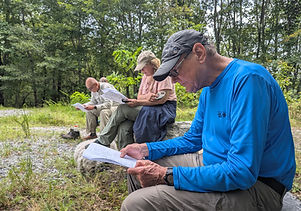Uncovering Lost History
Archaeological Discoveries Along the Trails

Standing in front of the Parsonage of St. John in the Wilderness, one sees a tranquil landscape of forested grounds surrounding the beautiful 1853 structure. But in looking around these woods, it’s hard to imagine what was once here.
Recent research has brought to light forgotten chapters of St. John’s history. An ongoing project of the church’s Archives Committee focuses on transcribing early parish records, dating back to the church’s founding in 1836. These archives include handwritten Vestry meeting minutes and Parish Register books, as well as hundreds of letters, bills, receipts, financial documents, and contracts for repairs to church property and grounds. In late 2023, while going through a stack of old documents—some of which have not been seen in over a century—the Committee found multiple references to a “Servants’ House” near the Parsonage. Until then, the very existence of such a building had been forgotten; no later records or local histories mentioned it.
The Spirituality of Creation
Why Do We Pray In Nature?
.jpg)
When we gather for worship in the Episcopal tradition, the Sacraments are central to who we are and how our life is sustained. The Church has learned from Scripture and Tradition that the Sacraments are outward and visible signs of an inward and spiritual grace, given by Christ as a sure means of grace. For example, we receive the Eucharist as a gift from God that sustains us. Christ’s very self somehow enters into us through the visible and tangible gifts of bread and wine.
But the Sacraments don’t stop at the altar or the baptismal font. As we get to know Christ better, we find him present all over the place: inside of us through the Holy Spirit, with those who are hurting in their suffering and the compassion of others, and in the natural or created world. In fact, the Scriptures speak about Christ as central to the creative work of God in the beginning of our time: "In the beginning was the Word, and the Word was with God, and the Word was God..."
Christian Community as Wilderness
What Does Discipleship Have to Do with Wilderness or the Church?

It should not surprise us to see in the Scriptures example after example of people encountering God in wild and beautiful places. In fact, the Wilderness is repeatedly an important part of the story of God’s people – whether it’s Noah’s flood-level boating, Abraham’s backpacking trip, the wilderness training school of an entire nation in the Exodus, or Jesus and his disciples pushing the limits of Galilean sailing and desert mountain exploration. The Gospels tell story after story of Jesus spending time in wild places so he can spend time in God’s presence and face his own trials of the body and the soul.
As modern Americans, we live perhaps more disconnected from Creation than anyone before us – and to our own spiritual and physical detriment! Jesus and his disciples slept out under the stars. They ventured into stormy seas together. They risked going to places inside themselves that they never knew existed. They climbed mountains, loved their enemies, and ate with people of every kind, all while trusting God more and more. When we return to the wilderness, we find God present to us and we find our own being more fully revealed.


